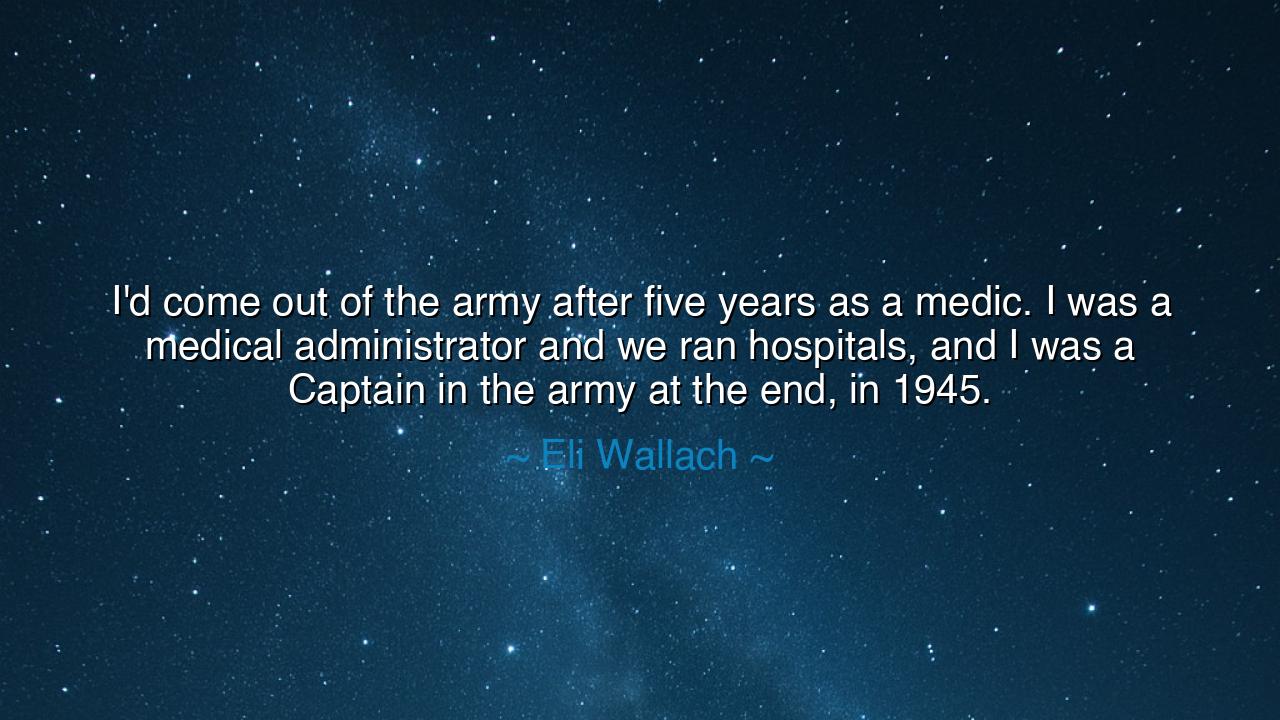
I'd come out of the army after five years as a medic. I was a
I'd come out of the army after five years as a medic. I was a medical administrator and we ran hospitals, and I was a Captain in the army at the end, in 1945.






In the humble yet noble words of Eli Wallach, there echoes the voice of a generation that knew the weight of service and the discipline of sacrifice: “I’d come out of the army after five years as a medic. I was a medical administrator and we ran hospitals, and I was a Captain in the army at the end, in 1945.” These are not the boastful words of a conqueror, but the reflective tones of a man who had seen both the suffering and the strength of humanity. Beneath the simplicity of his statement lies a deep truth — that the forge of duty shapes character, and that the soul tempered by service carries its lessons for a lifetime.
To understand the meaning of these words, one must first see the man within the uniform. Eli Wallach, known to the world as a brilliant actor, began not upon the stage but in the quiet halls of wartime hospitals, where life and death stood side by side. As a medic, he was no stranger to agony or endurance. He saw the fragility of flesh and the resilience of spirit. In his post as a medical administrator, he bore the weight not of fame but of responsibility — organizing care, leading men and women through the chaos of war, and striving to preserve life amidst destruction. It was there, not on the battlefield, that he came to understand the heroism of compassion.
The origin of his reflection lies in the aftermath of the Second World War — that vast storm of human suffering and courage that tested an entire generation. Wallach’s words mark a turning point, 1945, when the guns at last fell silent. The world, broken but breathing, stood at the edge of rebirth. For those who had served, the question was not simply “What next?” but “Who am I now?” To have been an army medic was to have seen the best and worst of mankind — the destruction wrought by hate, and the miracles wrought by love and endurance. When Wallach returned from that crucible, he carried not only the title of Captain, but the quiet wisdom of one who had looked into the depths of human nature and emerged still believing in its worth.
In the style of the ancients, we may say that Wallach’s service was his apprenticeship in humanity. Like the philosopher-king who learns not by luxury but by trial, he gained insight through labor and sorrow. The Greeks spoke of paideia — the shaping of the soul through education and discipline — and so it was with him. The army had not merely taught him to command; it had taught him to care. To lead others in healing during war is to walk between chaos and order, between despair and duty. This balance, once learned, becomes a man’s compass forever.
Let us look to another tale that mirrors his — that of Marcus Aurelius, the philosopher-emperor. Amidst the wars of Rome, Marcus did not lose himself to bloodlust, but used the turmoil to refine his understanding of duty and mercy. “Waste no more time arguing what a good man should be,” he wrote. “Be one.” Wallach, too, lived by this principle, though he spoke it not in marble halls but in hospital tents. His deeds, like the emperor’s words, remind us that greatness does not always wear a crown — sometimes it wears the coat of a medic and the quiet dignity of service.
There is also in his words a lesson of transformation. For after the war, Wallach did not remain in the realm of medicine, but turned toward the arts — to the theater, to film, to storytelling. Yet he carried his military years within him like a sacred inheritance. The discipline, empathy, and perspective forged in war gave depth to his craft. His performances, filled with soul and complexity, were the fruits of experience — proof that every season of hardship prepares us for a greater purpose. Thus, his life teaches that no path, however unlikely, is wasted; every trial is a teacher, and every act of service leaves behind wisdom for what comes next.
What, then, shall we take from this reflection? That duty is not a burden but a blessing — for it molds the heart, sharpens the mind, and roots the soul in purpose. Whatever one’s calling — be it to heal, to lead, or to create — let it be done with the same spirit that guided Wallach: the calm strength of one who serves not for glory, but for good. Let us also remember that honor is not confined to the battlefield, nor greatness to power. Sometimes, it is found in the quiet work of those who heal, those who guide, and those who rebuild what war or life has broken.
So let this truth be passed down as wisdom to future generations: service refines the soul, and from the fires of discipline arise compassion, courage, and grace. Eli Wallach’s words remind us that before the man became an artist, he was first a healer; before he played heroes and villains on the stage, he served real lives in the world. And perhaps that is the truest artistry of all — to live first as a servant of life, and to carry that humanity into everything one creates thereafter.






AAdministratorAdministrator
Welcome, honored guests. Please leave a comment, we will respond soon